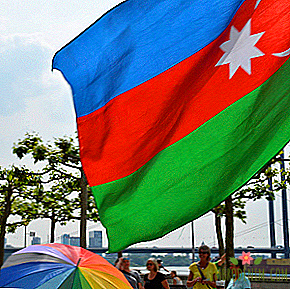Kazus Zurabishvili: Why is it not enough for the president to be a woman?

Dmitry Kurkin
"For the first time a woman was elected president of Georgia" - it was not necessary to be a visionary to predict that the headlines of news about the victory of Salome Zourabichvili would be such. The gender issue inevitably came to the fore, although this is far from the only angle at which the election race can be viewed (opposition leader Grigol Vashadze was leading for a long time, and now his supporters dispute the results, accusing opponents of putting pressure on the electorate and using administrative resources) or a figure newly elected president - candidates from the ruling party; a native Frenchwoman with Georgian roots, who for a long time was treated with prejudice in their historic homeland; a policy that some experts consider to be a pro-Kremlin protege, despite her statements about rapprochement with Europe. But these decompositions later, in distant paragraphs - and the “woman president” will go first. Even though, historically, women in Georgia’s policy, from Queen Tamara to Nino Burjanadze, have played an important role.
The emphasis on gender is generally understandable. The gender imbalance in politics is still too great to be ignored: according to the UN, in June 2016, the share of women among parliamentarians around the world was only 22.8 percent - twice as many as twenty years ago, but still very far from any parity. Meanwhile, gender equality in societies is primarily a matter of power, including political. And therefore, from any elected national leader, women are expected by default for statements on the "women's agenda". "The first woman president in the history of the country" is not so much a line in the biography as the projected responsibility: if a woman does not stand up for women's rights in power, then who else?
The “female factor” still has a strong influence on the outcome of the elections - if Hillary Clinton was a man, her campaign in conservative states could have been much more successful. However, over the past half century, women in high politics, if they have not achieved equality, have certainly ceased to be exotic. Since the time of Sirimavo Bandaranaike - the first woman who became the head of her country (Sri Lanka) as a result of elections, and not inherited power - women have been prime ministers and presidents in more than seventy countries of the world. And if before Indira Gandhi and Margaret Thatcher themselves were rare exceptions, and their biographies were a ready-made basis for inspiring stories, then in 2018 it was time to give up feigned surprise and admiration for "woman in politics".
And it’s not only that there are enough conservatives among women who were world leaders who adopted the rules of the game and rhetoric from their male colleagues (“Emancipation of women is one big nonsense. Men discriminate. They can’t bear children, and hardly someone will be able to do something with this ", - the words, in the authorship of which you can suspect some Facebook troll, actually belong to Golda Meir, the fourth Prime Minister of Israel), although they also set an unhealthy climate that supports the internal misoginiy due to which women do not just win the elections - they are even afraid to participate in them.
The proportion of women in power is not that strongly correlated with the real power of women or the improvement of their rights.
Precedents for the election of a woman as head of state are important - and because each of these examples adds a crack to the “glass pans”, and because the more often women appear at summits, the more normal the situation is when a woman is at the helm of the country (or in the case of the Prime Minister of New Zealand, Jasinda Ardern, working mother). Conversely, when no one in the country seriously considers it possible to elect a woman as president (as in today's Russia), this speaks of gender inequality more than any representativeness figures.
If we are talking about numbers - statistical calculations should not be misleading. The proportion of women in power is not so strongly correlated with the real power of women or the improvement of their rights. The record of women's representation in parliament (more than two thirds of the seats) has recently been held by Rwanda, a country that remains one of the worst in the world in terms of respect for basic human rights.
The emphasis on the gender of the president or the prime minister (hello to recent materials about Croatian President Kolind Grabar-Kitarovic) says that sexist political bias is still considered the norm and will not be outdated any time soon. Just being a woman politician in the 21st century is no longer enough. At the level of national politics, a person with authority is worth asking for - regardless of gender (or, for that matter, sexuality and ethnicity: Irish Prime Minister Leo Varadkar, an openly gay with Indian roots, serves as an excellent example of how minorities may be combined with fairly conservative political views). In many cases, it is less important than other nuances of the political background, party registration and public statements on key issues. After all, there are enough women politicians in Russia, but Elena Mizulina, Irina Yarovaya or Irina Rodnina are unlikely to be remembered for the deputies and authors of discriminating laws because of their gender.
Photo: Mikhail Japaridze / TASS




